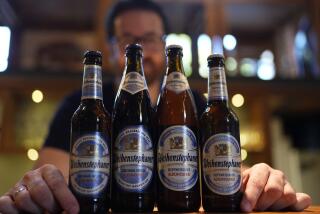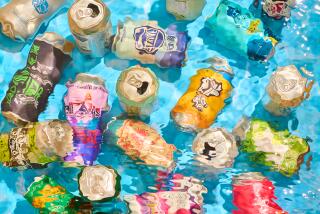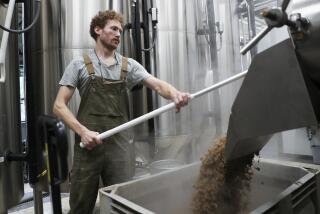Anheuser-Busch Taps the Thirst for Imported Beer
- Share via
Is this beer for you?
Anheuser-Busch Cos. sure hopes so. The brewing kingpin has rolled out an upscale beer in Los Angeles and other select cities to compete against the imported brews whose sales are barreling along in an otherwise stagnant market.
The world’s largest brewer figures its Anheuser World Select can tap Americans’ thirst for foreign-tasting suds. But it won’t be an easy sell, despite Anheuser-Busch’s huge marketing muscle.
Persuading fans of Corona, Heineken and other imports to buy a domestic beer of any taste “is a tall order,” said Harry Schuhmacher, publisher of Beer Business Daily, a trade publication.
The problem for Anheuser Busch is that a big part of the imports’ appeal is that they’re, well, imported.
“Beer drinking is all about image,” Schuhmacher said. “High-end imports have done extremely well. Anheuser-Busch has watched this growth, and they’ve largely not participated.”
Marlene Coulis, Anheuser-Busch’s director of new products, said World Select would change that. She said the new beer, a year in development, meets import fans’ desire for “a fuller flavor, more hops and ... a little stronger of a finish.”
But Anheuser-Busch appears to be hedging its bets. The new beer will be sold in only 10 selected markets around the world, including the Los Angeles area.
World Select will be priced in line with imports, which typically sell in Southern California supermarkets for $7 to $10 for a six-pack, compared with $4 to $7 for domestic brands.
For all the appeal Anheuser-Busch says its new offering will have, World Select isn’t expected to radically alter the company’s fortunes.
“Even if it’s wildly successful in those 10 markets, it’s not going to be a big driver for them,” said Eric Shepard, executive editor of Beer Marketer’s Insights, another industry journal. “But it makes sense” to battle the imports “and they’re going to give it a shot.”
Based in St. Louis, Anheuser-Busch has about half the U.S. beer market and last year shipped 128 million barrels globally, posting sales of $15.7 billion. It sells such mainstream brands as Budweiser, Bud Light and Michelob. The company’s 12 domestic breweries include one in Van Nuys; World Select will be bottled in Baldwinsville, N.Y.
Because it holds equity stakes in several foreign brewers, including Mexico’s Grupo Modelo, maker of the popular Corona beers, Anheuser-Busch has profited from the import boom. Those equity holdings last year generated 18% of Anheuser-Busch’s earnings of $1.93 billion.
They have helped Anheuser-Busch thrive despite the flat beer market. Its stock has far outpaced the broader market the last two years. The stock closed Friday at $52.63 a share, down a penny, on the New York Stock Exchange.
Total U.S. beer sales last year, at 204.9 million barrels, marked an increase of 11.5 million barrels from 1997, representing average annual growth of only 1% to 2%. And 9 million barrels of that gain came from imports, according to Beer Marketer’s Insights.
Also helping Anheuser-Busch are its huge economies of scale and widespread distribution that make it more efficient, a big advertising budget and 2% price hikes that Anheuser-Busch has pushed through in each of the last four years.
To develop World Select, the company called on 10 of its brewmasters from around the globe. One of them, Greg Suellentrop, said the result is a dark golden, Pilsener-style beer with an aroma that highlights its heavy dose of hops and malt. “Today’s beer drinker is looking for a little more sophisticated beer,” Suellentrop said. “They want beers a little ‘hoppier,’ a little ‘maltier.’ It’s a challenge to meet their constantly changing tastes.”
Imports might meet that taste test, but their popularity has grown in large part because their producers excel at marketing the brands, especially with television advertising, said Shepard of Beer Marketer’s Insights.
“Beer is still a badge,” he said. “There’s still brand equity in beer brands, and imports have always had a cachet in the U.S.”
That’s not lost on Anheuser-Busch. The company is quick to point out that World Select comes in green bottles with embossed labeling. It so happens that Heineken, a top import made by the Dutch brewer Heineken, also comes in green bottles.
Said Heineken spokesman Dan Tearno: “They’re clearly trying to catch on to something that we’ve made a great success.”
More to Read
Inside the business of entertainment
The Wide Shot brings you news, analysis and insights on everything from streaming wars to production — and what it all means for the future.
You may occasionally receive promotional content from the Los Angeles Times.











